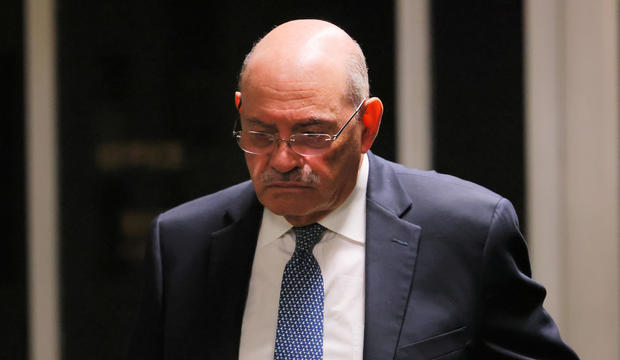Allen Weisselberg, the former Trump Organization chief financial officer who pleaded guilty to tax fraud and other crimes, was released from jail Wednesday, records show.
Weisselberg spent 100 days in New York City’s Rikers Island jail, beginning in January, serving more than two-thirds of his five month sentence, after appearing as the star witness for prosecutors in the corporation’s tax fraud trial. Two Trump Organization companies were found guilty of 17 counts related to tax fraud and other charges on Dec. 6, 2022.
Weisselberg spent nearly half a century working for the Trump Organization, and was for decades former President Donald Trump’s right-hand man at the company, overseeing the company’s finances before and after Trump left to serve in the White House.
Weisselberg and the two Trump Organization companies, called the Trump Corporation and Trump Payroll Corporation, were indicted in July 2021, accused of using a variety of methods to reduce payroll liability from executive salaries through untaxed bonuses and luxury perks worth millions.
Michael M. Santiago / Getty Images
A spokesperson for Manhattan District Attorney Alvin Bragg declined to comment.
Weisselberg pleaded guilty in August 2022 and agreed to testify against the company as part of a deal with prosecutors. He was sentenced to five months in jail, a term that began Jan. 10. From the start, his former attorney Nicholas Gravante said they believed he would serve about 100 days, with early release for good behavior.
“Anyone who truly knows Allen feels sorry that he had to go through this. I hope he can now retire in peace, spend time with his wonderful family, and leave the circus in the rear view mirror,” Gravante said Wednesday. “It was my honor and privilege to have represented him. He’s a true gentleman.”
Weisselberg’s current lawyer did not reply to a request for comment.
A spokesperson for the Trump Organization did not immediately reply to a request for comment. After its Dec. 6 conviction, the company blamed Weisselberg in a statement sent to media.
“Mr. Weisselberg testified under oath that he ‘betrayed’ the trust the company had placed in him and that he, at all times, acted ‘solely’ for his ‘own personal gain’ and out of his ‘own personal greed,” the Trump Organization spokesperson said. “The notion that a company could be held responsible for an employee’s actions, to benefit themselves, on their own personal tax returns is simply preposterous.”
Weisselberg testified about a series of schemes over the course of several days in November, describing methods used by Trump Organization executives to avoid taxes, and payroll liability, on large bonuses and luxury benefits.
Weisselberg and other witnesses described an internal “clean up” conducted in 2017 at the corporation after Trump became president. The Trump Organization hired an outside lawyer to examine its tax practices and her review led the company to cease many of the practices that led to these criminal charges, they testified.
Weisselberg switched attorneys about a month ago, following a dispute among lawyers representing him and, separately, the Trump Organization, about whether Weisselberg should cooperate with the Manhattan District Attorney in another investigation, according to a source familiar with the matter.
The source said the matter was unrelated to the charges filed March 30 against Trump, who was indicted on 34 felony counts of falsification of business records.
Trump entered a not guilty plea to the charges on April 4. He vehemently denies wrongdoing in the case and has accused Bragg of political bias in connection with his, the company’s and Weisselberg’s prosecutions.
